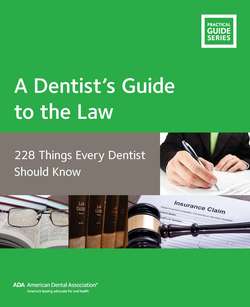Читать книгу A Dentist’s Guide to the Law - American Dental Association - Страница 18
На сайте Литреса книга снята с продажи.
Considerations as You Prepare to Interview the Attorney
ОглавлениеFees. Advertisements can be misleading. An attorney might advertise a low price that does not include other costs (such as filing fees, copying and fax charges, etc.). Be sure you know whether the attorney will be charging you on a flat-fee basis or by the hour. You will want to have an estimate, in most cases, of how much the attorney’s services will cost for your particular matter, and when you will be expected to pay before you hire him or her. You may wish to request a written engagement agreement with the attorney that details the engagement, including fees.
• Be aware that some lawyers charge for an initial interview. As previously noted, you should know ahead of time whether there will be a charge for this initial visit and, if so, how much it will be. The initial meeting by itself does not mean you have committed to hire the attorney.
• There are several types of fee structures:
Hourly rates: A fee calculation based on cost per hour for the attorney’s services
Fixed fee: A flat fee charged for a simple service, such as the review of an agreement, a real estate closing, or an uncontested divorce
Contingent fee: A fee consisting of agreed-upon percentage of money the client receives from a settlement, which may include the out-of-pocket costs or expenses incurred in the transaction or lawsuit
Miscellaneous fees: Filing fees (physical and e-filing), photocopying, transcription, phone calls, messenger services, serving papers, witness fees, travel expenses, etc. Some lawyers also charge for work done by their paralegals/legal assistants
Practice Record. Though online reviews can be misleading, there are several ways to check an attorney’s online reputation. One method is to check your state bar association’s website, which may provide information as to whether any complaints, misconduct charges, or malpractice accusations have been filed against the attorney.
Experience. You may wish to ask the prospective attorney to describe the level of his or her experience. Based on the nature of the case, you may not always need the most experienced attorney. A relatively inexperienced attorney might be sufficient for a small matter (such as a residential real estate closing), and hiring such an attorney may save you money. More complex legal matters may call for a more experienced attorney, whose fees are likely to be significantly higher.
Communication. Legal matters require clear, consistent, and reliable communication between client and attorney, especially in a complex or extremely important matter (such as where your dental license may be at risk) which may last for several months or more. You should choose an attorney who commits to respond to calls and emails in a timely manner. You might attempt to test this by sending an email to the law office after an initial visit, detailing a few questions you might have. A delayed response might indicate that the attorney is too busy to give your matter the attention you would want.
Personality. An attorney’s personality may be important to you, since you should feel comfortable in his or her presence and working with him or her. You may need to openly share private information so that he/she can effectively represent you to achieve the best outcome. If you withhold information because you do not feel comfortable with your lawyer, that decision could negatively impact your results.
